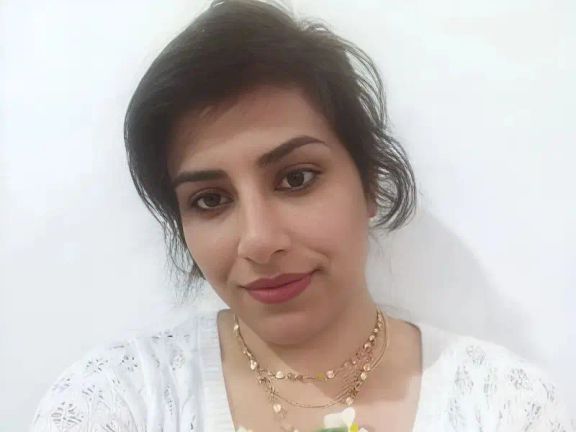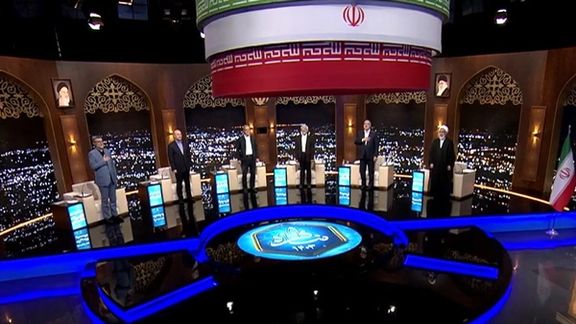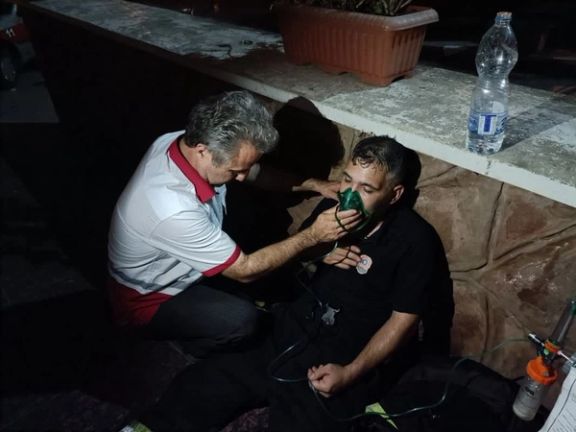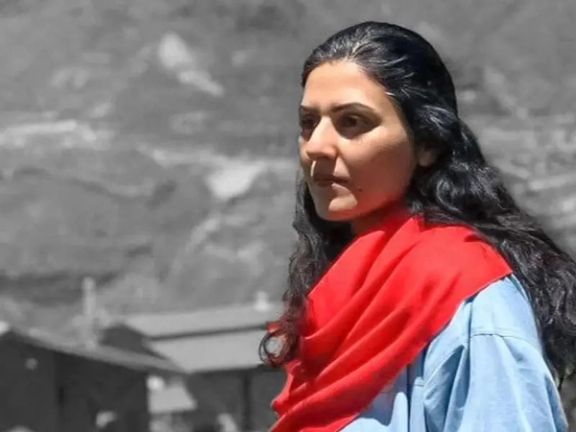Iranian Political Prisoner Calls for Boycott of Upcoming Presidential Polls

From the confines of Evin prison, political prisoner Mahboubeh Rezaei has slammed the upcoming presidential elections taking place against mass government opposition.

From the confines of Evin prison, political prisoner Mahboubeh Rezaei has slammed the upcoming presidential elections taking place against mass government opposition.
In a public letter, Rezaei said that “the Islamic Republic has no legitimacy, and this is a bet on the government's losing horse, repeating past mistakes.”
Since the 2022 uprising, Iran's government has faced the biggest legitimacy crisis since the founding of the Islamic Republic, with record unemployment, record poverty and mass social crackdowns on the populace.
She stated, "Once again, the Islamic government is seeking legitimacy by creating a choice between bad and worse, which has been the method of reformists for years".
Rezaei was arrested by security forces on May 22, 2023, and sentenced to 26 years in prison for "undermining national security" after supporting the Woman, Life, Freedom movement.
Golrokh Iraee, another political prisoner who criticized the government just a day earlier, called the encouragement to participate in the elections by reformists a "betrayal", though only one of the six candidates in the upcoming June 28 poll is from the reform camp, all others staunchly conservative allies of Iran's theocratic dictatorship.
Both prisoners argue that meaningful change is unattainable through the current electoral system, which they claim is rigged to favor the regime's interests to institute another ally of the ageing supreme leader, Ali Kahemenei.
Participation in the polls, called in the wake of the sudden death of President Ebrahim Raisi in a helicopter crash last month, is expected to hit record lows, similar to the March parliamentary elections. Unofficial reports estimate voter turnout to have been as low as 10 percent, with the last two presidential polls similarly low.

The Office of Iran's Supreme Leader issued a warning against the 'misquoting’ of Ali Khamenei and his officials by presidential candidates and their teams in a bid to further contol the campaign narrative.
A statement released Tuesday stated: "Any quote not documented by existing and written records of the statements and comments of the Supreme Leader of the Islamic Revolution lacks credibility and reference."
The office criticized the "incomplete or incorrect references" made by presidential candidates and their associates, insisting that all quotes must be verified through official documents.
During the televised campaigns for the June 28 snap presidential election, candidates handpicked by the core of the establishment frequently invoked quotes and remarks by Ali Khamenei to lend credibility to their statements.
While the directive is perceived as an effort to tighten control over information and mute independent voices before the elections, many interpret this as Khamenei's strategy to distance himself from any potential failures of the next president.
The elections have been called in the wake of the sudden death of President Ebrahim Raisi last month in a freak helicopter crash.

A fire erupted early Tuesday at Qaem Hospital, a private medical facility in the northern Iranian city of Rasht, claiming the lives of nine patients.
Health Minister Bahram Einollahi said at a press conference on Tuesday afternoon that so far, nine patients have lost their lives in the fire. Initially, authorities announced the death toll at eight.
Mohammad-Taghi Ashoubi, the president of Gilan University of Medical Sciences, announced that another patient has died, increasing the death toll from the fire.
According to local media, the fire department and Red Crescent teams responded to the scene, managing to extinguish the fire and facilitate the evacuation of patients and staff.
According to Ashoubi, initial investigations show that the fire at the Qaem Hospital started in the UPS room and emergency power facilities in the lower floors of the hospital.
UPS systems are used in hospitals for various purposes, including providing emergency power, supplying electricity during peak demand periods, improving the quality of AC power, reducing noise, and eliminating power fluctuations.
Tasnim news agency, affiliated with the Revolutionary Guards, reported that at the time of the incident, the hospital was operating near its full capacity with 142 of its 250 beds occupied.
At least 110 people have been transferred to another hospital following the blaze.
Authorities have launched an investigation into the cause of the fire, and forensic medicine specialists are examining the circumstances leading to the fatalities, added Tasnim.
In February, the health ministry revoked the licenses of 100 ailing hospitals and put 250 more on probation amid patient safety concerns.
Saeed Karimi, the Deputy Health Minister, said warnings had been given. "Out of the 350 hospitals expected to take action, only 200 have complied. As a consequence, licenses for 100 hospitals, including Gandhi hospital, have not been renewed."
Speaking to ISNA, he admitted that many of the hospitals have been operating for over 25 years and are in dire need of renovation.
On January 25, a large fire broke out at Gandhi hospital, a prominent healthcare facility in northern Tehran. The blaze engulfed the building's exterior facade, prompting an evacuation of the premises. There were no immediate reports of casualties, although the cause of the fire remained unknown.

The Canadian parliament, across all three main party platforms, has unanimously passed the Toomaj Sanctions, related to the death sentence issued for a dissident Iranian rapper.
The motion, proposed by the Iranian Justice Collective (IJC), sanctions 31 judicial officials involved in the death sentence of rapper Toomaj Salehi.
The IJC compiled the names of 31 judges, prosecutors and investigators of the Islamic Revolutionary Court across its 70 branches, including the judge who sentenced Toomaj Salehi to death, to be added to the existing list of sanctioned Islamic Republic officials.
Monday morning members of the IJC Nazanin Afshin-Jam and Tara Dachek joined Senator Julie Miville-Dechêne, and MPs Ali Ehsasi and Heather McPherson in Ottawa to present the motion before the vote.
Toomaj, a beloved dissident rapper, was sentenced to death for his lyrics criticizing the Islamic Republic. The artist and his song became popular in 2022 during nationwide anti-government protests in Iran.
He was initially arrested in October 2022 for his support of the Woman- Life- Freedom movement.
After his release, Toomaj described being "severely tortured" during his time in prison. Just two weeks after his release, he was arrested again in late 2023, and charged with "corruption on earth" - a crime punishable by death.
Speaking in Ottawa Monday, human rights activist Nazanin Afshin-Jam asked people to imagine if Canadian rapper Drake was sentenced to death simply for his lyrics.
"Canadians would be outraged," she said, "And that's the horror Iranians feel."
"He [Toomaj] was tortured. He had his legs and arms broken and they injected him with unknown substances while he was in detainment in the prison cells in Iran to to extract false confessions," said Afshin-Jam.
Fellow IJC member Tara Dachek knows the struggles the Iranian people face living under a repressive regime. She came to Canada just five years ago to escape the authoritarian laws that Amnesty International has labelled a "war on women and girls" and as a "gender apartheid" state.
"His bravery inspired me so deeply. Imagine knowing that rapping is illegal in Iran, yet choosing to use your legal name and voice to fight against one of the most brutal regimes in the world," said Dachek.
Dachek described Toomaj's voice and his rap music as his only weapon, and she vowed to be his voice now.
Toomaj sanctions in Canada follow the Toomaj Act in the United States last month, which passed a bipartisan act calling also for targeted sanctions for certain judges, prosecutors, and investigators of across branches of the Islamic Revolutionary Courts of Iran. It also codified the position of the United States that judgments issued by Islamic Revolutionary Courts against political prisoners are a violation of human rights.
The Canadian motion, spearheaded by NDP Foreign Affairs Critic Heather McPherson also condemns gender apartheid, violations of civil liberties, killings and acts of violence committed by the Islamic Republic of Iran against its own people.

Reza Pahlavi, Iran's exiled prince, condemned the recent exchange of Hamid Nouri, a man he labeled a "war criminal," for two Swedish citizens, calling it "an irresponsible and unethical action."
In a statement released on social media, Pahlavi criticized the move as “detrimental not only on moral grounds” but also for the interests of Sweden and Western countries, describing it as a “harmful act.”
Nouri, who had been imprisoned in Sweden since 2019 and was sentenced to life for his involvement in the execution of political prisoners in Iran in 1988, was released on Saturday. The exchange has sparked outrage among human rights activists and families of the victims.
The two Swedish citizens released by Iran were arrested on trumped-up charges and detained without due process of law. Iran often engages in the practice to use the detainees as bargaining chips in its dealing with Western countries.
Pahlavi linked the timing of Nouri's release to the upcoming presidential elections in Iran, suggesting it was orchestrated to demoralize opposition voices and mislead the public into participating in what he described as an electoral "circus." He asserted that the Iranian regime employs such tactics to project a facade of inclusivity and democracy, which he vowed would meet with a resolute “no” from the “freedom-loving Iranian populace.”
Furthermore, Pahlavi argued that “although the exchange of this criminal is a damaging and unconstructive action, it actually makes us Iranians abroad more determined to organize and mobilize for maximum pressure on the regime and maximum support for the people of Iran.”

Golrokh Iraee, a political prisoner currently held in Tehran’s Evin Prison, has expressed her strong disapproval of the 'reformists' participating in the upcoming June 28 presidential elections.
In a letter from prison on Sunday, she stated: "The reformists should know that we, the people of Iran, remember their betrayal from the first day and we will not forget it."
In her letter, Iraee condemned the 'reformists', accusing them of working to "destroy youth and future generations."
Iraee’s letter is a vehement critique of the political faction within the Islamic Republic's system known as 'reformists', accusing them of betraying the Iranian people and recalling the brutal history of political repression and violence in the country.
Iran's 'reformists' emerged in the 1990's advocating for social and political freedoms and the rule of law. However, from the early 2000s, hardliners loyal to Supreme Leader Ali Khamenei reacted by systematically curbing their influence. The election of populist neo-conservative Mahmood Ahmadinejad in 2005 further marginalized 'reformists' from critical government positions.
During the 2009 presidential election, 'reformists' rallied behind their candidate, Mir Hossein Mousavi, who controversially lost to Ahmadinejad. This sparked widespread protests against Ahmadinejad's re-election, met with harsh repression including hundreds of arrests and intimidation. Many opponents of the Islamic Republic argue that the clerical system of government, has been beyond reform all along and that the reformists gave false hope to the people that religious dictatorship can be improved and reformed to address Iran's pressing issues.
Iraee's letter begins by detailing the harrowing history of cultural purges, the expulsion of students and professors, and the systemic use of torture and forced confessions in prisons during that era. She condemned the reformists for their complicity and inaction during these times, as well as their role in the chain murders.
"We will not forget the cultural revolution and the expulsion and house arrest of students and professors, the elevation of ignorance over merit, the killings, torture, rape, forced confessions, and coercing political prisoners to execute their friends in the prisons of the 1980s."
In her statement, Iraee highlighted the mass executions of political prisoners in the 1980s, a period marked by severe human rights abuses. "We will not forget the consolidation of power of the Islamic Republic and the catastrophic killing of young people in the 1980s; in the days when you Hezbollites and followers of the Imam's line were at the head of affairs," she wrote.
"When nearly a thousand people were slaughtered in the chain murders within a few years, you became mere logistical support to avoid accountability," Iraee stated.
Turning to the repression of protestors, Iraee accused the reformists of abandoning the people during the 2009 Green Movement protests and the bloody crackdown on demonstrators in 2019.
"In Ashura 2009, when the protests escalated beyond your controlled narratives and crossed the boundaries of your slogans, you abandoned the people who had come to the streets due to the atmosphere you created and your claims of lost votes, leaving them to be killed, sentenced to execution, and tortured in prisons," she charged.
Iraee criticized the reformists for their repeated failures to stand by the people, instead using them as pawns in their political games. "We, the people on the streets, were always your extras to pressure from below while you negotiated from above to re-enter the power game," she wrote. She continued, "When people came to the streets in 2017 with the slogan 'Reformist, Hardliner, The Game Is Over,' you, as usual, changed your skin and color."
She lambasted the 'reformists' for their role in perpetuating economic hardships and social inequalities, accusing them of exploiting the working class and ignoring their struggles. "You are the continuators of Mohammad Khatami's policies and Akbar Hashemi Rafsanjani's economic policies; symbols of exploitation of the lower class. How dare you speak of the lower class and their struggles when you have reached your positions by feeding off their diminishing resources," Iraee asserted.
In a particularly vivid passage, Iraee declared, "We have passed beyond reform. You continue to recycle the promises of Mohammad Khatami, who in 2019, after the massacre of protesters, called us destructive waves and thanked the Supreme authorities. Now you have returned to once again destroy the youth of future generations just as you did to us. With the people who have not only passed through Khatami but also set fire to the shroud of reforms. Put on the uniform of fundamentalists and shoot from the front."
Iraee’s letter underscores a deep sense of betrayal felt by many Iranians towards the reformists, accusing them of failing to deliver on promises of civil rights and social justice, highlighting their role in sustaining the oppressive regime.
"You have always spread despair in society, and your existence has been an opportunity for the regime's survival,” Iraee added.
Iraee further criticized 'reformists' for standing alongside someone who says, 'We won't introduce new policies because Khamenei sets the general directives.'"
She was referencing Masoud Pezeshkian, the sole approved 'reformist' candidate who in his first interview following his approval from the Guardian Council to run for presidency stressed that his government would not introduce any new economic strategies and policies.
"The people of Iran will not forget your loyalty to the Islamic Republic. The day the people on the streets settle accounts with the Islamic Republic, they will also deal with you, the regime's enablers," Iraee warned. She concluded with a vision of accountability: "When the people of Iran decide the fate of the Islamic Republic on the streets, they will also settle accounts with you, the opportunists and apologists whose names are etched in infamy on the political history of Iran."
Iraee's letter is a testament to the ongoing struggle for justice and accountability in Iran, reflecting the deep-seated grievances of a populace long subjected to political repression and betrayal. Her statement reflects a deep mistrust and resentment towards the Islamic Republic, including the reformist faction.